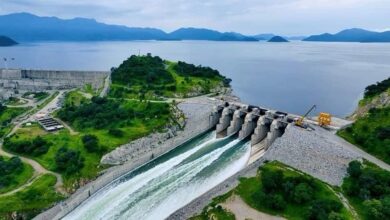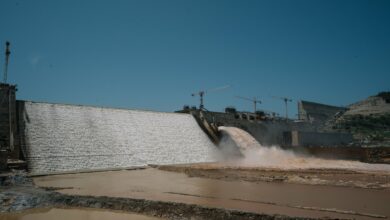ASWAN – Sixty years ago, a military coup brought Gamal Abdel Nasser into power. Shortly after, the Colonel ordered the construction of a High Dam at Aswan to generate power, and regulate the seasonal flooding of the Nile. It was to be his signature national project.
The Aswan dam is remembered by most Egyptians as one of the former leader's greatest accomplishments, a towering monument to the modernizing aspirations of an independent nation. But, for a few thousand Nubians living in the Upper Egyptian governorate of Aswan, the dam destroyed a way of life.
Compulsory immigration of Nubians started in 1902 when construction of the Aswan reservoir flooded a few of the 44 villages that were home to Egypt's Nubians living in the area now known as old Nubia.
When construction of the High Dam started in 1963, the largest migration occurred, taking the Nubians away from a way of life based around the river Nile, to a desert life in villages built for them in the area of Kom Ambo, known as new Nubia.
Those who are old enough to have lived in old Nubia remember it with painful nostalgia and carry bitter memories of the day they had to desert their homes and watch them sink beneath the rising waters.
Ahmed Abdallah, a retired customs employee who lived in old Nubia until the age of eighteen says life there was as good as it gets.
People in old Nubia lived in close communities surrounded by nature, he recalls. The problems of poverty and unemployment were irrelevant, by his recollection, as they lived off the land and the river, and made extra money through commerce.
"We would eat dates all day and use our hats, or the scarves of women, to catch fish. We made our own bread and never got sick," says Abdallah. The grief is visible in his eyes as he looks into the distance.
"When they built the High Dam, they threw us here like cattle. We were leaving and the water was flooding the place behind us," Abdallah remembers. "The old people cried, they knew what we were losing. Many of them died because they couldn't adapt to the new environment," says Abdallah as he sits in the village of Armenna, in new Nubia.
Sixty years later, Nubians still complain that they haven't received their promised land compensation. Some haven't even been housed yet.
In their new location, they complain of the poor state of electricity, water supply, and health services. They also complain of the lack of investment in the area which has led to a high unemployment rate.
Despite the difficult life that the High Dam has brought them, most Nubians are themselves not immune from a certain affection for Nasser, and his dam.
"He did us wrong, but he did it with the intention to produce good for the whole country. Naturally, he wasn't going to let a few villages get in the way. We just wish he had relocated us to a higher place in our old area instead of sending us here," says Ramadan Ahmed, 59.
The relocation didn't only make the life of the Nubians harder, it also threatens to cause the extinction of the Nubian culture.
Sitting in front of his house in Armenna, 69-year-old Nubian artist Imam Gamal quizzes his younger friends in the meaning of a Nubian word in a popular song by Mohamed Mounir, himself of Nubian origins.
"Do you know what the meaning of 'siya' is?" he asks enthusiastically. When they all fail to answer he sadly says, "we are losing our language, and our traditions are also fading away."
After the relocation to new Nubia, new schools were built that teach Arabic, but not the Nubian language. Other upper Egyptians have also moved to new Nubia, integrating both cultures through coexistence and intermarriage.
Most Nubians who were born following the relocation speak little to no Nubian. Many of the younger generation have abandoned the traditional dress for jeans and shirt. They are unfamiliar with aspects of their Nubian heritage, preoccupied with fitting in with the rest of the Egyptian society.
Older Nubians complain the most of the change on the people. They say that their struggle to survive their difficult life has tainted their former kindness and morals.
Fawzeya Gamal says that even though it's been over a half century, like most older Nubians, she hasn't yet adapted to life in new Nubia.
"Since I came here I started to develop illnesses. We used to love each other and eat together, now everyone closes their door. I'm not comfortable here. I dont like it," she says.
In 2011, protests by Nubians demanded a return to the area around Lake Nasser. The government renovated some villages such as Adandan and Karkar for this purpose. However, many don't want to move back.
While older generations still hold fast to the dream of returning to the banks of the Nile, younger generations are more preoccupied with fixing the problems they face in new Nubia, and have no interest in going back to old Nubia, of which they have no memories.
"Why would we leave here and go back to a desert to start over?" asks Hassan Farouk, who works in the postal service in new Nubia. "Instead of relocating us, they can use this money to start projects here," he says.




